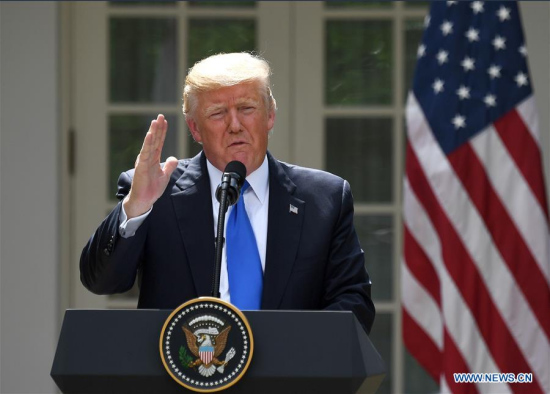
U.S. President Donald Trump (Xinhua file photo/Yin Bogu)
While U.S. President Donald Trump made no drastic changes in his new Afghanistan strategy, he did make a number of tweaks that, when taken together, could add up.
In a speech on Monday night, Trump laid out a new plan for the U.S. war in Afghanistan, which began 16 years ago and stands as America's longest war.
"It's not going to produce an outright victory," Michael O'Hanlon, a senior fellow on foreign policy at the Brookings Institution, told Xinhua.
"But if you reverse the momentum, and help the Afghans maybe regain a little bit of territory here and there, you change the psychology of a lot of key people," he added.
The main change Trump made was to take restrictions off U.S. forces, imposed by the former administration, which critics said hindered U.S. commanders in the field.
"Micromanagement from Washington D.C., does not win battles," Trump said in Monday night's nationally televised speech.
Trump also threatened to cut off aid to Pakistan, which borders Afghanistan, as the U.S. government accuses Pakistan of harboring terrorist networks. Changes also include not publicly announcing timelines for the withdrawal of U.S. forces, as divulging such information gives an edge to the enemy.
The United States would also "no longer use American military might to construct democracies in far-away lands or try to rebuild other countries in our own image," Trump said, adding that he also aims to boost U.S. troop levels.
NO EXIT STRATEGY NEEDED?
Americans are weary of the war and critics have said the United States needs an exit strategy, but O'Hanlon said: "I don't even worry about exit strategies."
"We're so used to thinking about how exit strategy must be a necessary part of the policy. I would just say why is that the case?" he said.
"This is probably going to be a generation-long struggle. And I believe we actually need a number of assets in key parts of the Middle East to wage the long term fight against extremism, viewing Afghanistan...as a partner and an ally, and an asset for the broader counter terrorism fight," he said.
The United States became involved in Afghanistan not long after the 2001 attacks on New York and Washington, as terror group al-Qaida, which masterminded the 9/11 attacks, was given safe haven in Afghanistan.
At the time, the nation was run by the Taliban, a radical Islamist group that terrorized the civilian population and enforced an ultra-strict version of Islam.
While al-Qaida is now a shell of its former self, terror group Islamic State has overtaken territory in the Middle East. While the group is on the run, it remains dangerous.
Moreover, the radicals are influential, having inspired myriad attacks in Europe and the United States in recent years.
COLOMBIA A POSSIBLE MODEL
O'Hanlon compared Afghanistan with the South American nation of Colombia, noting that the country's fight against insurgents had lasted 51 years.
"Finally, about 15 years ago, started the turn in momentum, when extremists were no longer winning," he said.
"About four years ago, the (insurgents) realized that they had basically been beaten. And at that point they just tried to get as good terms as they could in the negotiations to protect their leaders from jail," he said.
"So that is a viable model here," he said. "You have to stay patient in these things."
"The enemy is patient, and unless we think that we should let the enemy win just because they are more patient than we are -- which I would hope people would not fall into that trap -- then you have to stay with it," he said.
"(The Taliban) just has to be beaten to the extent that is possible and then outwaited. And I think because it does threaten our security interests to have a Taliban run country providing sanctuary to extremists, we have a very important interest in this," he said.


















































